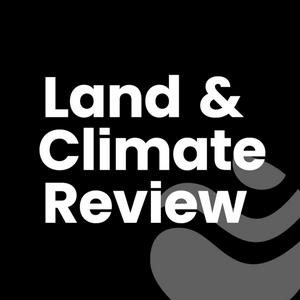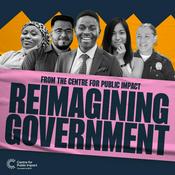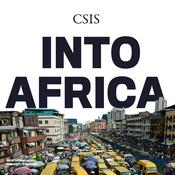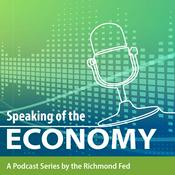118 episodes
- In September 2025, Vladimir Putin acknowledged that the climate crisis presents “risks” for Russia that are “very dangerous”. Though not unprecedented, such statements differ from other Russian government messaging that has argued climate threats are overstated as part of a Western agenda, or that climate change could benefit the country. Is the state’s narrative changing?
This week on The Land and Climate Podcast, Alasdair MacEwen is joined by Marianna Poberezhskaya to discuss the history of complex and often contradictory climate politics in Russia. They also discuss Russia’s burgeoning climate conspiracism, the history of climatology through the fall of the Soviet Union and Russia’s increasingly isolationist stance on climate cooperation.
Marianna Poberezhskaya is an Associate Professor in Politics and International Relations at Nottingham Trent University, where she researches climate discourse from non-democratic governments and their nations’ media, with particular focus on Russia.
Further reading:
'Explainer: How Russia seeks to 'instrumentalise' climate issues at COP30', Clare Denning, 2025, BBC
'Conspiracies as one of the dangers of online climate change communication: origins, spread, and impact', Marianna Poberezhskaya, 2025, Routledge handbook on climate crisis communication pp. 229-239
'Climate obstruction in Russia: surviving a resource-dependent economy, an authoritarian regime, and a disappearing civil society', Marianna Poberezhskaya and Ellie Martus, 2024, Climate obstruction across Europe pp. 214-242
'Russian climate scepticism: an understudied case', Teresa Ashe and Marianna Poberezhskaya, 2022, Climatic Change 172 (3-4)
Send us a text
Click here for our website to read all our most recent Land and Climate Review features and pieces. - President Trump has long expressed ambitions to annex Greenland, with mentions of the US acquiring the Danish autonomous territory dating back to 2019. But the US relationship and interest with Greenland goes back centuries.
In a bonus episode of the Land and Climate Podcast, Alasdair is joined by returning guest and Arctic expert Mia Bennett to examine Greenland’s complex history and connections to the US, Trump’s recent interest, and her views on the reasons behind them.
Mia Bennett is the co-author of "Unfrozen: The Fight for the Future of the Arctic," published by Yale University Press. She is an associate professor of geography at the University of Washington and the founder of Cryopolitics, a blog covering contemporary and historic developments in the Arctic.
Further reading:
Unfrozen: The Fight for the Future of the Arctic, Yale University Press, 2025
Trump and Rutte cannot make a deal without Greenland at the table', Julie Rademacher, Financial Times, 2026
'Greenland: Staying with the Polar Inuit. How a secret military base helped trigger the silent collapse of an Arctic world', Ludovic Slimak, The Conversation, 2026
'The cryosphere is nearing irreversible tipping points – and the world is not prepared', Letizia Tedesco, Josephine Z. Rapp and Petra Heil, Land and Climate Review, 2025
The Ice at the End of the World: An Epic Journey into Greenland's Buried Past and Our Perilous Future, Jon Gertner, Postscript Books, 2019
Crimson, Niviaq Korneliussen, Anna Halager (Translator), Virago Books, 2018
So You Want to Own Greenland?: Lessons from the Vikings to Trump, Elizabeth Buchanan, Hurst Publishers, 2025
This Cold Heaven: Seven Seasons in Greenland, Gretel Ehrlich, Fourth Estate, 2003
Send us a text
Click here for our website to read all our most recent Land and Climate Review features and pieces. - Bertie is joined by Mark Jacobson, Professor of Civil and Environmental Engineering at Stanford University, whose research formed the foundation for the Green New Deal. In his new book, “Still No Miracles Needed: How Today's Technology Can Save Our Climate and Clean Our Air,” he underlines that we have already developed the technologies necessary to solve the climate crisis.
Dr. Jacobson argues that wind, water and solar power are the most effective tools for reducing emissions, that the development of energy-intensive “unicorn technologies” such as carbon capture and storage only prolongs fossil fuel use.
Mark Jacobson is Director of Stanford’s Atmosphere and Energy Program and a co-founder of The Solutions Project, which advances clean, renewable energy systems. His new book is available to buy here from Cambridge University Press, with 20% off using the discount code “NOMIRACLES20”.
Further reading:
'Carbon capture does not reduce emissions: these three case studies prove it', Mark Z. Jacobson, Land and Climate Review, 2026.
Wind and solar overtook fossil fuels for EU power generation in 2025, report finds, Ajit Niranjan, The Guardian, 2026.
No Miracles Needed: How Today's Technology Can Save Our Climate and Clean Our Air, Mark Z. Jacobson, Cambridge University Press, 2023.
100% Clean, Renewable Energy and Storage for Everything, Mark Z. Jacobson, Cambridge University Press, 2020.
'A path to sustainable energy by 2030', Mark Z. Jacobson and Mark A. Delucchi, Scientific American, 2009
Correction notice: in the original upload of this podcast, Bertie mistakenly referred to the publisher of Still No Miracles Needed as 'Stanford University Press', rather than Cambridge University Press. This was removed on 27/1/25.
Send us a text
Click here for our website to read all our most recent Land and Climate Review features and pieces. - Last September, power cuts and water shortages triggered civil unrest in Madagascar, leading to the dissolution of its government. In recent months, Iran’s water crisis has led to public demonstrations and even a warning from President Masoud Pezeshkian that Tehran could be evacuated. Protests over access to food and water are intensifying globally.
Dagomar Degroot returns to the podcast to discuss the role of climate change in regime breakdown. He and Alasdair discuss historical examples of societal collapse influenced by climatic conditions, the effects of the “Little Ice Age” on droughts and harvests, and how the Global North might be less resilient than many realise.
Dr. Dagomar Degroot is Associate Professor of Environmental History at Georgetown University, an expert on climate change, space exploration and existential risk. His forthcoming book, “Ripples on the Cosmic Ocean: How the Solar System Shapes Human History – and May Help Save Our Planet,” will be published by Penguin in February. Listen to Alasdair and Dagomar’s discussion about the book here.
Further reading:
'After Ruining a Treasured Water Resource, Iran Is Drying Up', Fred Pearce, Yale Environment 360, December 2025.
'Climate crisis or a warning from God? Iranians desperate for answers as water dries up', Patrick Wintour, The Guardian, November 2025.
'Madagascar’s president dissolves government amid youth-led protests', The Guardian, September 2025.
Goliath’s Curse: The History and Future of Societal Collapse, Luke Kemp, 2025.
'Climate, peace, and conflict—past and present: Bridging insights from historical sciences and contemporary research', Sam White et al., Ambio, 2025.
Megadrought and Collapse: From Early Agriculture to Angkor, Harvey Weiss (ed.), 2017.
Questioning collapse : human resilience, ecological vulnerability, and the aftermath of empire, Patricia A. McAnany & Norman Yoffee (eds.), 2010.
Send us a text
Click here for our website to read all our most recent Land and Climate Review features and pieces. - The Arctic is heating four times faster than the global average, with scientists predicting the Arctic Ocean will be completely free of ice in summer by the early 2030s. This rapid melting presents an existential threat to Arctic infrastructure and ecosystems, as well as opening new claims on strategically valuable resources. As temperatures rise in the Arctic, so do geopolitical tensions.
This week, Alasdair is joined by Mia Bennett, co-author with Klaus Dodds of “Unfrozen: The Fight for The Future of The Arctic,” published by Yale University Press. Mia explains the environmental consequences of melting permafrost, the roles multilateral organisations and Indigenous communities have within policymaking, and the growing militarisation of the region.
Mia Bennett is Associate Professor of Geography at the University of Washington, and a British Academy Visiting Fellow at UCL’s Centre for Outer Space Studies. Her book "Unfrozen” and long-running blog “Cryopolitics” examine Arctic developments – including the science of climate breakdown, national and Indigenous politics, and the emergence of new markets.
“Unfrozen: The Fight for The Future of The Arctic,” is available to purchase from Yale University Press here.
Further reading:
'Have we reached peak Arctic Circle?' Mia Bennett, Cryopolitics, 2025
'The cryosphere is nearing irreversible tipping points – and the world is not prepared', Letizia Tedesco, Josephine Z. Rapp and Petra Heil, Land and Climate Review, 2025
Floating Coast: An Environmental History of the Bering Strait, Bathsheba Demuth, WW Norton & Company, 2019
The Paradox of Svalbard: Climate Change and Globalisation in the Arctic, Zdenka Sokolíčková, Pluto Books, 2023
'Russia’s espionage war in the Arctic', Ben Taub, The New Yorker, 2024
Seven poems from Dark Traffic, Joan Naviyuk Kane , 2021
Send us a text
Click here for our website to read all our most recent Land and Climate Review features and pieces.
More Government podcasts
Trending Government podcasts
About The Land & Climate Podcast
The editorial team from The Land and Climate Review interview thinkers and policymakers in the world of economics, land-use and climate policy. Find more on our site at www.landclimate.org
Podcast websiteListen to The Land & Climate Podcast, Who the Health Cares? with Prof Michael Sparer and many other podcasts from around the world with the radio.net app

Get the free radio.net app
- Stations and podcasts to bookmark
- Stream via Wi-Fi or Bluetooth
- Supports Carplay & Android Auto
- Many other app features
Get the free radio.net app
- Stations and podcasts to bookmark
- Stream via Wi-Fi or Bluetooth
- Supports Carplay & Android Auto
- Many other app features


The Land & Climate Podcast
Scan code,
download the app,
start listening.
download the app,
start listening.


































